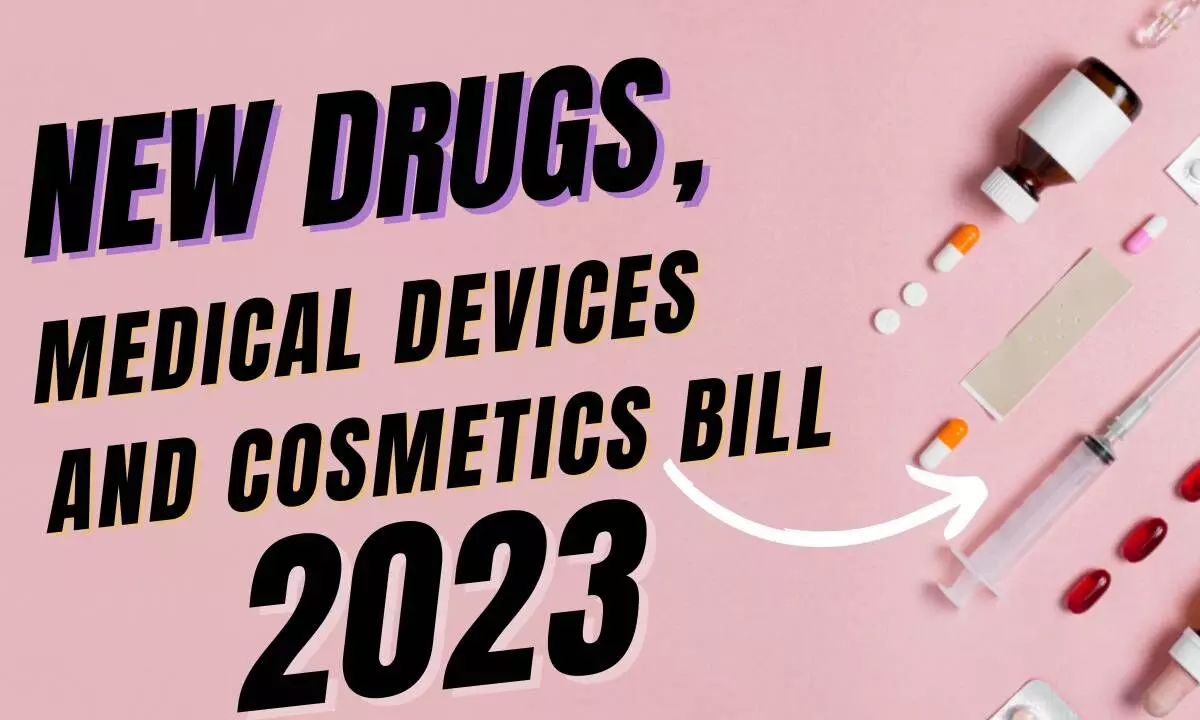New Bill will streamline pharma and medical devices industries
Drugs, Medical Devices and Cosmetics Bill 2023 will replace the obsolete Drugs and Cosmetics Act, 1940
image for illustrative purpose

The Central government will be tabling the Drugs, Medical Devices and Cosmetics Bill 2023 in Parliament during the ongoing monsoon session. The bill is expected to streamline the pharmaceutical and medical devices industries as it will replace the 83-year old Drugs and Cosmetics Act, 1940 to regulate the import, manufacturing, distribution and sale of drugs, medical devices and cosmetics. It is also likely to ensure quality, safety, efficacy, performance and clinical trial of new drugs and clinical investigation of investigational medical devices, among others, apart from regulations on Ayush drugs, and others.
The Union Health ministry’s path-breaking initiative will have a cascading effect on pharmaceutical and medical devices industries. Moreover, it is a comprehensive legislation with provisions to regulate medical devices, clinical trials and online pharmacy, among others, in order to keep pace with changing needs, times and technology. The draft bill includes provisions through which the Central Licensing Authority, can in public interest, abbreviate, defer or waive offer such pre-clinical and clinical data requirements for approval of new drugs pertaining to life-threatening diseases or rare diseases or diseases of special relevance to the country, in such manner as may be prescribed.
Apart from the provisions to form Drugs Technical Advisory Board (DTAB), the Bill proposes constitution of Medical Devices Technical Advisory Board (MDTAB) to advise the Central and State governments on technical matters related to medical devices arising out of administration of the proposed Act. Besides, a Drugs, Medical Devices and Cosmetics Consultative Committee (DMDCCC) will advise the concerned authorities on matters tending to secure uniformity in administration of the proposed Act. The DMDCCC will be headed by the Drugs Controller General and shall consist of members representing the Central and State governments, who are slated to meet at least twice in a year.
In what can be a timely step to meet emergency situations like Covid, the bill specifies that the Centre can regulate or restrict the import of drugs, in public interest if the drug is essential to cope up with any emergency. If the use of any drug or cosmetic is likely to involve any risk to human beings or animals or that any drug does not have the therapeutic value claimed for it, the government may, by notification in the official gazette, prohibit the import of such drugs and cosmetics in public interest.
Chapter IV in the draft Bill has been expanded to include clinical trial of drugs, along with the existing manufacture, sale and distribution of drugs and cosmetics. If the licensing authority has reasonable ground for believing that any licensee has failed to comply with any provision of the Act or rules, it can issue an “improvement notice” to the licensee stating the grounds, specifying the failure and the measures needed to be taken to secure compliance within a reasonable period of not less than 14 days. If the response is not satisfactory, the licensing authority shall suspend or cancel the license. The regulations related to clinical trials are also included in this chapter. For the import of drugs and cosmetics which are prohibited under the Act, officers of customs and officers empowered under the Customs Act, 1962, shall have the powers and the Commissioner of Customs or any authorised officer may detain any imported package which he suspects contains prohibited drugs or cosmetics and shall report to the DCGI. The chapter also deals with the penalty for import of drugs or cosmetics in contravention of the proposed regulation.
In yet another feature, in a bid to boost to alternative medicines, the draft has a dedicated Chapter V, for ayurveda, siddha, sowa rigpa, unani and homoeopathic drugs. A separate consultative committee has also been proposed in Chapter V. A scientific research board will be constituted to support the regulatory authority on the scientific advances used for developing, innovative ayurveda, siddha, sowa rigpa, unani and homoeopathic drugs, their efficacy, devices and other such related matters like import.
Chapter VI has been dedicated to import, manufacture, sale, distribution and clinical investigation of medical devices. As regards drugs and cosmetics, the licensing authority has to issue an improvement notice to the licensee if they have failed to comply with any provision of the Act and if the licensee does not take measures to secure compliance within 14 days, the officer can suspend or cancel the license after due procedure. The bill prohibits people from selling, keeping stock or exhibiting or offering for sale or distribution any drug online, except in accordance with a license or permission issued by the authority.
(The author is freelance
journalist with varied experience in different fields)

